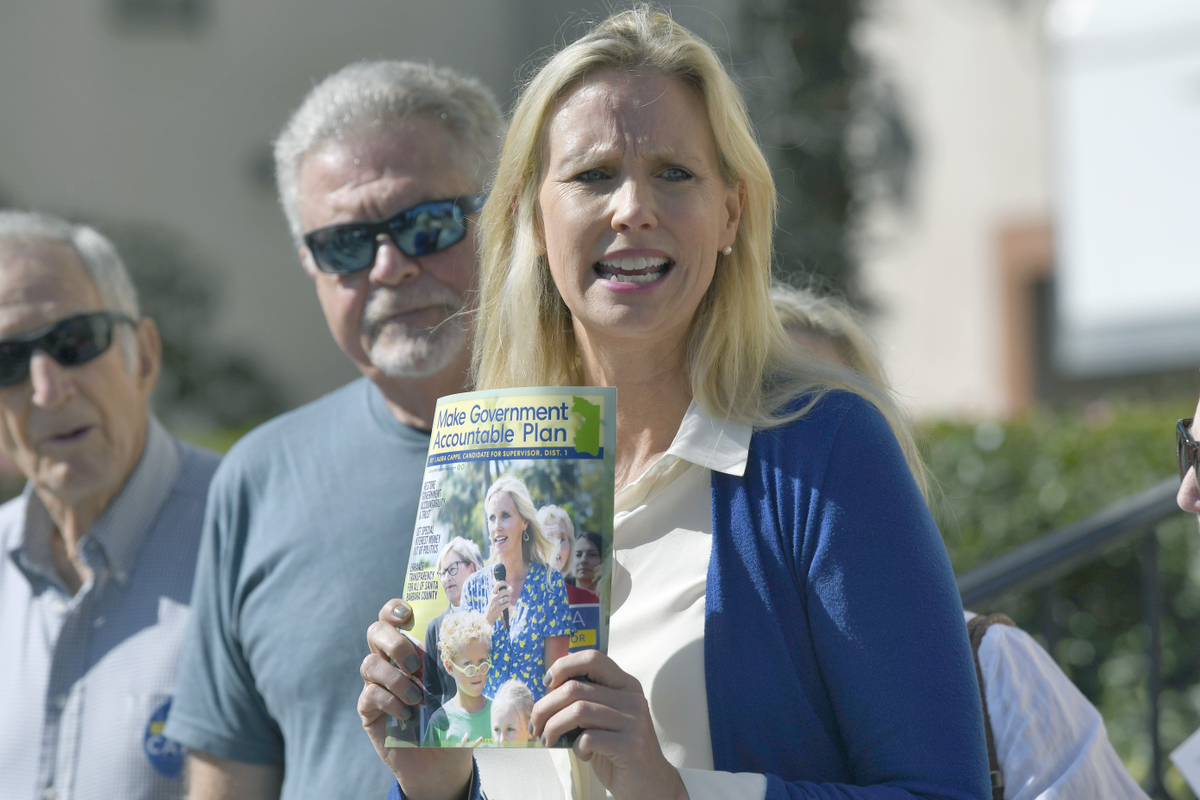Candidate Capps Proposes Campaign Finance Limits
In Fight for 1st District Supervisor, Williams Calls It a 'Stunt'

Laura Capps stepped up her quest for the county’s 1st District supervisor seat, currently held by Carpinterian Das Williams, with a proposal to limit campaign contributions and to “ban contributions from anyone with business before the board.” That could affect constituents ranging from cannabis growers seeking permits to the county unions in contract negotiations. Both groups give heavily to supervisor campaigns, and elected officials themselves give each other thousands of dollars for their campaigns. Williams called her plans a “poorly thought out political stunt.”
Anticipating the contest before the vote in March 2020, Capps argued that those with money have too much power; she wants a county law to limit contributions in the supervisor races to $1,000. Former supervisor Susan Rose stood beside Capps as she made the announcement, though Capps said she hadn’t yet spoken with the sitting supervisors about her plan. The dozen other supporters there, including publisher Sara Miller McCune and Carpinteria school board member Rogelio Delgado, have criticized Williams for being too friendly with cannabis interests. Capps’s campaign manager, David Brostrom, distributed a list of contributions to Williams from growers, many allegedly linked in time to appeals or permit applications, adding up to $62,200.
In a phone conversation while Williams traveled to Cuyama for a meeting on groundwater — which is critically drawn down in parts of the valley — he said it was easy to tie campaign contributions to the county’s cannabis issues, which have consumed more than 50 public meetings. “What she’s proposing would prohibit anyone who ever needs anything from the board from participating in politics,” he said. The only people who could participate after that “are rich people who support Laura Capps,” he shot back.
The back-room deals were possible, Capps claimed, because supervisors whose re-election campaigns are dormant only have to report campaign donations twice a year. To curb what she called a “public awareness blackout,” Capps proposed tying contributions to the election cycle — allowing them a year before and 90 days after an election, but not for the rest of the official’s term. Further, she said, overall expenditures should be limited to $250,000 in a primary and $500,000 in a general election.
She noted that Ventura County already has a $750 limit, Los Angeles County $1,500, and San Francisco $500. County election’s Joe Holland advised looking at Assembly Bill 571: Enacted last month, AB 571 limits contributions to $4,700 — unless from a committee independent of a candidate — for state office seekers per election. It allows cities and counties to set their own limits, as long as they do it before January 1, 2021; otherwise, the state law prevails. Up to 72 percent of counties lack such limits, author Assembly Speaker pro Tem Kevin Mullin (D-S.F.) stated.
“Constitutionally, for independent expenditures,” Williams explained — or political committees given license in the Citizens United case, and Buckley before it — “the courts have deemed we cannot control their spending. Instead of candidates formulating messages, it’d be the special interests.” Willliams claimed: “I would love campaign finance reform. But it’s gotta include a limitation on contributions combined with public financing,” in order to compete with independent committee coffers.
Among the supervisors’ biggest supporters — in contributions of money, endorsements, votes, and door-knocking time — are unions: firefighters, deputy sheriffs, and county workers. Williams cast Capps’s plan as one that would give an advantage to her donors’ interests against those of union members like firefighters. Capps said the union members she’d spoken with were positive about spending less on political campaigns. SEIU (Service Employees International Union) leader Bruce Corsaw was less sanguine, saying he wasn’t sure how the ban would affect the supervisors and his contract talks — which can take six months or longer and are due to start in January 2021 — and foresaw a lot of “challenges” in changing the government code.
Though the deputy sheriffs contract isn’t due for renewal until February 2022, Neil Gowing, president of the County Deputy Sheriff’s Association, said they appeared at the board regularly, often as advocates for critical resources or community issues like improving emergency response. He said his union “strongly supports campaign finance reform and policies that promote good governance. However, Laura Capps’ proposal will effectively ban public safety officers from participating in the political process and exercising our 1st Amendment right to free speech.”
In response, Capps, who sits on the Santa Barbara Unified School District’s Board of Education, pointed to her advocacy for teachers and staff pay raises: “It never even crossed my mind that their ability to contribute to campaigns would be relevant.” She said she respected the first responders and looked forward to continuing her support for labor “free from any perception of political influence — and based solely on the merits of the vital issues they advocate for.”
At Wednesday’s press conference, Jerry Roberts — covering the event for his blog, Newsmakers with Jerry Roberts — asked Capps if she was alleging there was corruption; he was the first to mention Williams by name or bring up cannabis. Capps demurred, asking Roberts what he meant: “Money goes in one end, and legislation comes out the other,” he elaborated.
Correction: The $3,000 state campaign limit in an earlier version of this story reflects the amount in a revision of the Political Reform Act of 1974; the number is currently $4,700 and is updated every two years. Comments from the deputies’ union and Capps were added to the story on Nov. 7.



